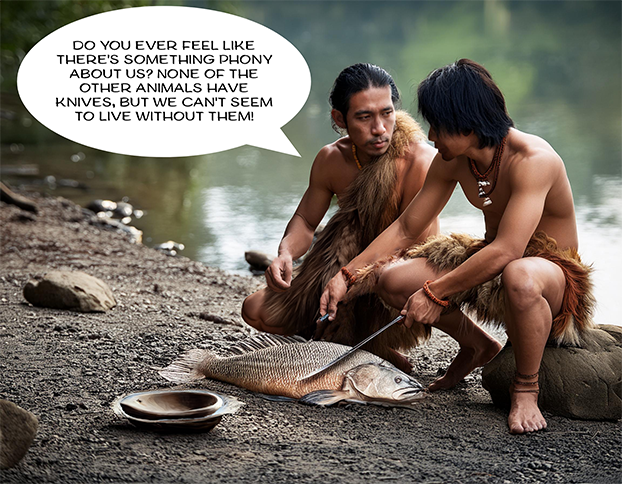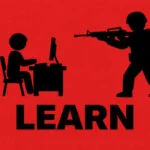After last week’s IT meltdown, which effected millions of people in various ways—from being stuck at airports to having heart surgeries postponed to simply not being able to access documents—some are lamenting how we suffer from “technological dependence.” Suggestions that technology, not humanity, is “in control” have also surfaced. Let’s put aside the theoretical dangers of some future AI becoming sentient and our robot overlords putting us in “People Zoos” and talk about where we are right now.
Intentionality is Key
Dependence and control are human concepts. A bee isn’t “dependent” on flowers, it looks for flowers. And neither the flower nor the bee is “in control.” The flowers grow as they have evolved to grow, and the bee seeks them out as it has evolved to do. That’s life. Survival and change over time are simply a collection of variables. Not until human beings—sentient, conscious creatures capable of moving beyond what they simply evolved to be—did concepts like dependence and control become meaningful. They remain meaningful only for human beings.
Over a very long period of time, when measured in human lifespans, humanity has gained a level of control that would seem godlike to most of our ancestors. We fly through the sky, capable of traveling the surface of the earth in a matter of hours rather than years, or being incapable of doing it at all. We can cut people open, take out their heart, make it work better, and put it back in place or replace it with another. We have not, however, escaped the fact that we live in a world of variables, and we will never be able to control all of them, or even anticipate all of them.
Consider the famous example of the Irish Potato Famine from 1845 to 1852. Phytophthora infestans, a water mold, caused a disease known as blight in Ireland’s potato fields, which were basically their only crop. It’s estimated that one million people died and more than that had to flee the country. Was the water mold in control? The technology of farming? Potatoes? No. Nothing was in control. Control is something that human beings have, thanks to increased knowledge of how the world works. Today, we can drastically reduced the impact of infectious diseases, in potatoes, humans, and many living things, but we cannot stop the existence of variables.
Similarly, consider advancements in weather prediction. In the past, people were at the mercy of the weather. A sudden storm or drought could mean the difference between life and death. Today, with satellite technology and advanced meteorological models, we can predict and prepare for extreme weather events, saving countless lives, so long as people pay attention to the warnings.
“Technological Dependence” is Nothing New
While we are not, “dependent on technology” or “controlled by it,” we cannot disentangle ourselves from it. We are tool making animals, who literally evolved to be what we are because of our use of technology, because of our efforts to better control our environment. “Technology” did not begin with computers, or the harnessing of electricity, or the invention of combustion engines. It goes all the way back to our most primitive tools, like the knife, and nothing since the invention of the knife has had a more dramatic impact on what we are today.
Homo sapiens (wise man) or modern humans, the species to which anyone reading this belongs, are not the first humans to walk this earth. We are just the only ones left. Homo habilis (handy man) went extinct about 1.6 million years ago Homo erectus (upright man) about 100,000 years ago, and Homo neanderthalensis (Neanderthals, named for a place rather than an attribute) only about 40,000. And there were others. At most, sapiens have only been here for 1 million years, with the oldest physical evidence only going back to 300,000 years. But knives have been around for at least 2.5 million years, which means that, “We,” Homo sapiens, had no part in their creation. To the contrary, without the knife we would not be here.
The knife is a seemingly simple invention, but it marks the start of revolutionary changes. Knives enabled early humans to hunt, process food, and craft other tools more effectively. These advancements contributed to the development of more complex brain functions and problem-solving abilities. Additionally, the dietary changes brought about by more efficient food processing influenced dental and digestive adaptations, while increased precision and dexterity in the hands was also favored by the evolutionary process. Over time, decorative knives became status symbols and key elements in human rituals. The knife was not just a tool; it was a catalyst for cognitive, anatomical, and cultural evolution.
The invention of knives inadvertently helped to shape sapiens into being; creating beings whose very nature is to adapt our environment to suit or needs and desires. But again, the knife had no intentions and exerted no control. It was an important variable to the way life unfolded on this planet, but a variable nonetheless.
Success is Born of Failure
The recent IT failure is a reminder that we must continue to improve and adapt. A software update went wrong, and people may be inconvenienced in various ways for a couple of weeks because of it. But how inconvenienced would they be if we didn’t have software? Were they more in control then? Future software problems may even result in fatalities. As horrible as that is, it is unlikely to ever cut our average lifespan in half, as it was just a little over 100 years ago.
The only things we are truly dependent on are human thought, human action, human choices, and a human commitment to adapt to changing conditions. Technology is the means by which we have adapted and it always will be. We can’t stop at today’s technology, let alone roll back the clock to an earlier era when technology was less helpful in our ongoing effort to control the variables of existence. Adapting and changing is what defines us and that means going through failures to get to success.
Last week’s server breakdown should encourage us to be smarter about what we do in the future, to have even more control over the variables of reality. But there will always be variables that are unforeseen. We won’t be in a better position to solve our problems if we start worrying about our alleged dependence and lack of control. Technology has made us less subject to the random variables around us and more in control of our existence. And that’s a trend that will continue, as long as we keep learning and adapting.
Recommended Reading: The Highs and Lows of Olympic History, The Both Sides Game













Leave a Reply